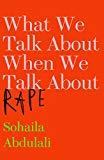
Disclaimer: I was given this book free of charge (via netgalley) in exchange for an honest review
Synopsis
Sohaila Abdulali was raped in her late teens, and nobody really cared. It set her off on a path to reveal the truth behind rape, and its victims. This book is made up of the stories she was told and the things she found out.
Review
Sohaila Abdulali was weeks from moving to America when she was raped in her home country of India. She was discouraged from reporting by the police, the very people who should have been protecting her. It wasn’t an unknown story, rape just wasn’t a topic discussed in India (despite a few exceptions, it still isn’t). A few years later Sohaila returned to India in the hop of exposing the rape culture in the country, but still nobody was willing to talk about it. She released an article, detailing her own experience, and returned to the US.
For thirty years she worked with rape survivors. Then came the publicised rape and murder of Jyoti Singh, and suddenly Sohaila’s story became international news, because she had been talking out against the culture that caused Jyoti’s rape.
This is when Sohaila started speaking out again. She had always wanted to change the world, and had been in her ‘small’ ways, but now she had a platform.
In ‘What We Talk About When We Talk About Rape’ Sohaila talks about her own story, and about Jyoti’s, and other widely known rape cases (like Brook Turner), but mainly she talks about the rape of ‘everyday’ women. Rapes that might have been reported, or might not, might have been taken seriously, or might not.
One thing I got from the book was how she didn’t like seeing the raped woman as a victim. She didn’t like the idea that a rape should define who a woman is. Yes it might be life changing, but it is just one part of a life. She talks about how women who are raped as perceived as overly innocent victims, or women who were asking for it, there’s no in-between where she just a ‘normal’ woman, and that’s what the majority are.
She talks about different cultures and how they view rape, and the damage which can be done by this.
There are some really inspiring and interesting stories. I think it’s good to know them, and I do like the overall message.
However I found in reading the book it was a little bit all over the place. The stories didn’t seem to fit together all that well, and at times Sohaila would go from talking about one ‘victim’ straight to another or to herself. She told her own story, but then peppered other bits throughout in ways that only really sometimes fits with what she had been saying previously. I do wonder if maybe it was on purpose to show the variety of women, that it shouldn’t all fit together like a jigsaw, but it made it a little difficult as a reader to read as a whole book. Part of it may have been because I had an ARC copy, so maybe the end formatting made chapters more obvious, but I still feel that it would be better as chapters for each subject, or each ‘victim’.
It probably is worth reading, for the stories and for the outlook. I’m certainly not regretting reading it.
3/5
Buy it:
Kindle (£1.49)
Paperback (£9.18)

